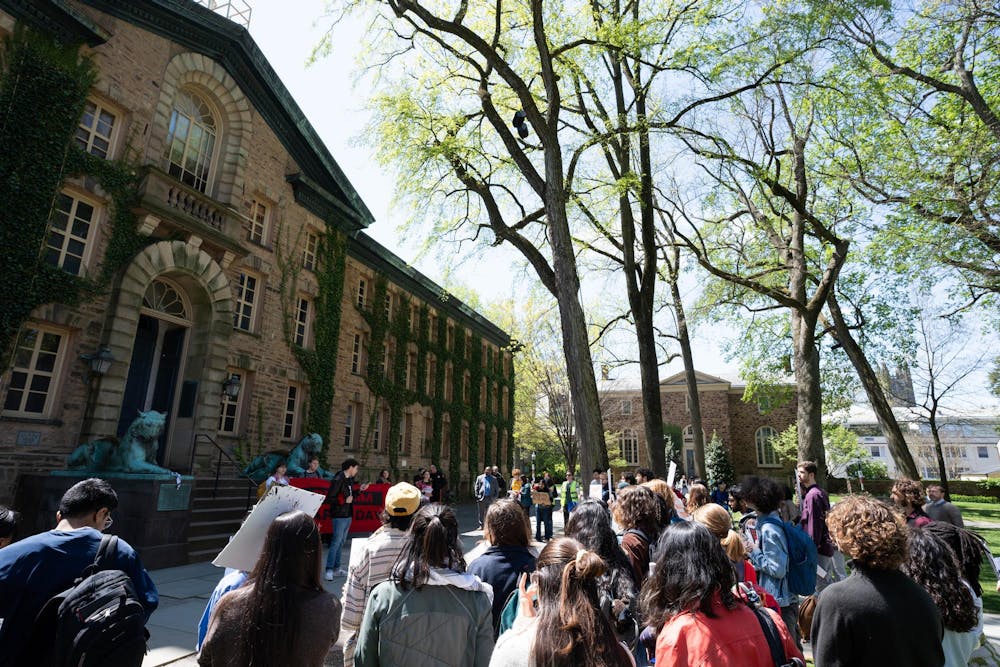Princeton’s Carbon Mitigation Initiative (CMI), a climate research institute, and fossil fuel company BP ended their 25-year partnership earlier this month. Our organization, Sunrise Princeton, has been working to end this partnership for half a decade. We had serious concerns with the ways that BP used CMI’s research as an excuse to double down on fossil fuels. Therefore, we see BP’s departure as a win for the climate movement.
Yet BP’s exit is a symptom of a broader political backlash against climate progress. As much as we would like to say that Sunrise’s pressure was the sole factor that forced the end of the partnership, that BP viewed funding CMI as no longer beneficial to its public image seems like the largest motivating factor. Broadly, fossil fuel companies have abandoned their deceptive climate pledges, and the Trump administration is cracking down on climate research. As governments and corporations abandon climate action, Princeton must step up as a leader on the issue. To do this, we demand that the University adopt a campus Green New Deal to advance and protect the role of its climate research, cut its ties with the fossil fuel industry, and bolster environmental studies teaching and learning.
BP was the last major fossil fuel industry sponsor of Princeton research after the University dissociated from certain oil and gas companies in 2022. The company funded CMI to launder its image and protect its fossil fuel interests in the public eye. To BP, CMI was a “core programme” in its project to “authenticat[e]” its “commitment to low carbon,” according to congressional investigators. Over the years, BP has cited its funding of CMI to claim it was a climate leader, even as the company delayed climate action: a textbook case of greenwashing.
Further, CMI helped BP legitimize its core business of fossil fuel production. For example, one CMI leader gave recommendations to fossil fuel executives about developing carbon capture technologies — a strategy used by oil companies to delay the transition to renewables — that could “enable the full use of fossil fuels across the energy transition and beyond.” We published a report last year that further detailed the harms this relationship caused.
BP’s departure indicates an abdication of environmental action across sectors. Amid global pullback from environmental pledges, the company appears to have reckoned that it does not need to worry about public opposition to inaction on climate change. In the run-up to its separation from the University, the company ditched its renewable energy pledges and doubled down on oil and gas projects, exemplifying a broader “green retreat” taking place across the private sector. The federal government under President Trump has also reversed course on climate action, tearing down renewable energy programs and dismantling climate research — including at Princeton.
This backlash jeopardizes the nation’s efforts to tackle one of the most pressing global issues of our day. As the public and private sectors retreat, Princeton can step into the lead. To do so, it must implement a campus Green New Deal to combat the nationwide backlash while advancing a bold plan for climate leadership.
Here’s what that means.
Princeton must find fossil-free sponsors for research labs that have had funding cut because of BP’s departure and Trump’s funding freezes, including the Geophysical Fluid Dynamics Laboratory, its flagship climate research lab. For CMI, we believe that labs associated with the institute can continue even without additional BP funding. Preserving Princeton’s climate research is insufficient on its own — it must also complete dissociation from the fossil fuel industry to protect researchers’ academic freedom and funding stability. And to advance Princeton’s climate research, the University must invest in environmental justice research through partnerships with frontline communities in New Jersey.

A Green New Deal for Princeton must include severing the University’s remaining ties to fossil fuels. This means completing divestment of the $700 million in privately held fossil fuel assets and cutting ties with companies under the PetroTiger umbrella, which have earned the University more than $149 million between 2004 and 2022. Climate leaders must also disclose their ties to the fossil fuel industry. To that end, the University must issue an annual fossil fuel accountability disclosure detailing its remaining financial ties to the industry.
A Green New Deal for Princeton will also enhance environmental teaching and learning. Princeton must solicit donations to establish an environmental studies major — which all other Ivy League universities have — that will provide a home for its scholars and cultivate undergraduate and graduate research. We also see the eventual creation of an environmental studies distribution requirement as necessary; in the future, students won’t be able to afford not to think about climate. And Princeton must upscale its climate science communications apparatus, modeling itself after universities in the United Kingdom that have established institutions for multimedia science communication that often feature climate science.
Finally, a Green New Deal for Princeton must include a legitimate plan to get to net zero greenhouse gas emissions. Currently, the Sustainability Action Plan relies on “innovative solutions” and “TBD” to complete its decarbonization goals. The University claims that “Princeton builds net zero 2046,” but it must follow through on those commitments and have a clear path to net zero.
With BP’s departure, Princeton has a chance to combat climate backlash with climate leadership. This year, we will demand that the University take that chance. But we need your support to make that happen. Today, Sept. 19, we are rallying at 1 p.m. in Firestone Plaza to call for a Green New Deal for Princeton. We invite you to join us.

Isaac Barsoum ’28 is a sophomore intending to major in Politics from Charlotte, N.C., and a co-coordinator of Sunrise Princeton. You can reach him at itbarsoum[at]princeton.edu. Barsoum is an Opinion columnist.
Charlie Yale is a sophomore from Omaha, Neb. and a co-coordinator of Sunrise Princeton. He can be reached at cyale[at]princeton.edu. Yale is an assistant Opinion editor.








